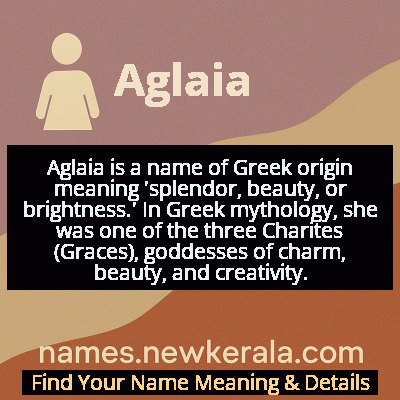Aglaia Name Meaning & Details
Origin, Popularity, Numerology Analysis & Name Meaning of Aglaia
Discover the origin, meaning, and cultural significance of the name AGLAIA. Delve into its historical roots and explore the lasting impact it has had on communities and traditions.
Name
Aglaia
Gender
Female
Origin
Greek
Lucky Number
4
Meaning of the Name - Aglaia
Aglaia is a name of Greek origin meaning 'splendor, beauty, or brightness.' In Greek mythology, she was one of the three Charites (Graces), goddesses of charm, beauty, and creativity.
Aglaia - Complete Numerology Analysis
Your Numerology Number
Based on Pythagorean Numerology System
Ruling Planet
Uranus (Rahu)
Positive Nature
Strong sense of order, loyal, practical, and disciplined.
Negative Traits
Stubborn, overly serious, rigid, and prone to feeling restricted.
Lucky Colours
Blue, gray.
Lucky Days
Saturday.
Lucky Stones
Blue sapphire.
Harmony Numbers
1, 7, 8.
Best Suited Professions
Managers, engineers, accountants, organizers.
What People Like About You
Dependability, discipline, practicality.
Famous People Named Aglaia
Aglaia Coronio
Arts Patron
Supported Pre-Raphaelite artists and maintained important artistic salons in Victorian London
Aglaia Kremezi
Food Writer
Internationally recognized authority on Greek Mediterranean cuisine and award-winning cookbook author
Aglaia Szyszkowitz
Actress
Prominent Austrian actress with extensive filmography in German-language cinema and television
Aglaia Mortcheva
Mathematician
Significant contributions to functional analysis and mathematical physics in 20th century Bulgaria
Name Variations & International Equivalents
Click on blue names to explore their detailed meanings. Gray names with will be available soon.
Cultural & Historical Significance
The Renaissance marked a major revival of Aglaia's cultural importance as humanist scholars rediscovered classical texts and artists like Raphael, Botticelli, and Canova created masterpieces featuring the Three Graces. These artworks symbolized neoplatonic ideals of divine beauty manifesting in the physical world. In 19th century literature, Aglaia gained new prominence through characters like Aglaya Yepanchin in Dostoevsky's 'The Idiot,' where she represents aristocratic beauty and spiritual complexity. The name's enduring appeal across different eras demonstrates how classical ideals of beauty and harmony continue to resonate in Western culture, making Aglaia a timeless symbol of artistic and spiritual radiance.
Extended Personality Analysis
People named Aglaia are typically associated with a constellation of positive traits reflecting their namesake's mythological heritage. They often possess a natural elegance and artistic sensibility that makes them stand out in social situations. Their 'brilliance' manifests as intellectual curiosity, creative problem-solving, and the ability to see beauty and potential where others might not. Aglaias tend to be socially adept, with a graceful manner that puts others at ease while maintaining an air of sophistication. They are often drawn to creative pursuits, whether in the arts, design, or innovative fields where aesthetic considerations matter.
Beyond their creative talents, Aglaias frequently demonstrate strong interpersonal skills and emotional intelligence. They have a knack for understanding social dynamics and often serve as peacemakers or harmonizers in group settings. Their mythological connection to the Graces suggests an innate ability to bring joy and beauty to everyday life, whether through personal style, home decoration, or the way they approach relationships. While they appreciate refinement and quality, genuine Aglaias are rarely superficial—their brilliance extends to depth of character, moral sensibility, and intellectual engagement. They often become the 'muse' figures in their social circles, inspiring others through their combination of beauty, intelligence, and warmth.
Modern Usage & Popularity
In contemporary naming practices, Aglaia occupies a unique niche as a classical name that remains distinctive without being completely unfamiliar. While it has never reached mainstream popularity in English-speaking countries, it maintains a steady presence among families with Greek heritage and classical education enthusiasts. The name has experienced a slight uptick in usage since the 1990s, coinciding with renewed interest in mythological names and the search for unique yet meaningful baby names. In Greece, Aglaia remains in moderate use, particularly in urban centers and among families valuing classical education. The name's rarity adds to its appeal for parents seeking something distinctive yet culturally substantial. Modern Aglaias often navigate between the full classical name for formal contexts and shortened versions like 'Aggie,' 'Lia,' or 'Glaia' for everyday use. The name's sophisticated sound and rich mythological background make it particularly appealing to parents in academic, artistic, and cosmopolitan circles who want a name that reflects both cultural depth and individual distinction.
Symbolic & Spiritual Meanings
Symbolically, Aglaia represents the concept of radiant beauty that transcends mere physical appearance to encompass intellectual, spiritual, and artistic brilliance. The name embodies the ancient Greek ideal of kalokagathia—the unity of beauty and goodness—where external splendor reflects inner virtue. As the Grace specifically associated with brilliance and adornment, Aglaia symbolizes the transformative power of beauty to elevate human experience and inspire creative achievement. Metaphorically, she represents the spark of inspiration that illuminates darkness, the harmonious balance between different forms of excellence, and the idea that true beauty radiates from within. In psychological terms, Aglaia symbolizes the integration of aesthetic sensitivity with intellectual depth and moral character. The name also carries connotations of refinement, elegance, and the ability to recognize and cultivate excellence in all aspects of life. For those who choose this name, it often represents hopes for a child who will bring light, beauty, and inspiration to the world through their unique combination of talents and qualities.

